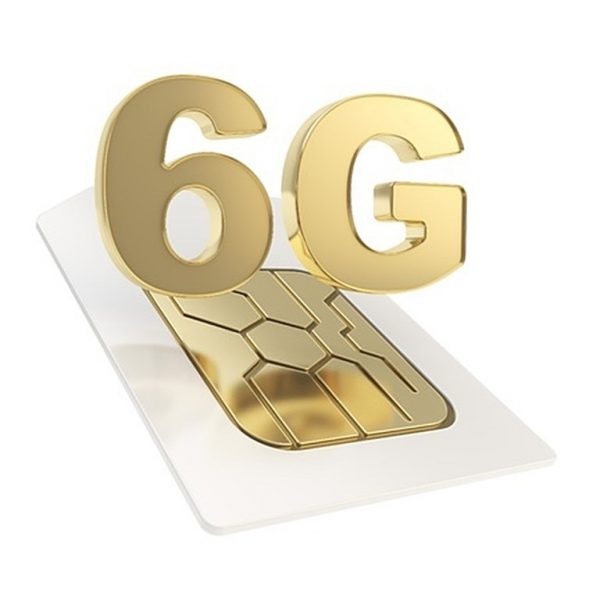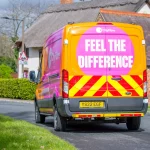Samsung Sets Out Plan for 6G Mobile Broadband at 1Tbps Speeds

South Korean tech giant Samsung, which has historically played a major role in the development of new mobile network technologies, has this week published some of its early research findings into the future 6th Generation (6G) of mobile broadband technology and set out what sort of technologies it may incorporate.
At present much of the world is still only just in the early phases of deploying commercial 5G networks, which have been designed to harness radio spectrum bands from the low 450MHz and all the way up to the millimetre wave (mmW) of 52GHz.
In theory, 5G can deliver peak (shared capacity) download speeds of up to 20Gbps (10Gbps upload) and latency times as low as 1-4ms. But in the real-world, such performance is often much slower due to various reasons, such as the differing distributions of spectrum frequency between operators, the lack of standalone 5G networks (many 5G networks still use some 4G infrastructure) and signal degradation over distance.
Advertisement
The next generation of 6G technology is still in the early research and development (R&D) phase, but after two years of work, Samsung has now set out the spectrum foundations (published here) for what it believes 6G should become and the technologies that will be needed to support it.
As usual with these things, it’s often necessary to wade through a mass of hyperbole – often encapsulated by the same sort of highly aspirational claims that preceded 4G and 5G networks before it (just put ‘ultra’ or ‘hyper’ in front of every claim, and you get the idea) – in order to get to the nitty-gritty of what sort of technologies Samsung thinks 6G will actually include. We’ve attempted to summarise these below.
One key goal here is to achieve data rates of up to 1Tbps (Terabits per second or 1000 Gigabits per second), although we’d tend to treat that in much the same way as people should treat the 20Gbps target for 5G (i.e. not likely to be very reflective of the real-world experience).
Samsung’s Proposed 6G Technologies and Enhancements
➤ Adopting sub-THz Bands
6G will harness the same spectrum bands as 5G, but it will also go beyond 52GHz and potentially push up to 300GHz. The high-band frequency range can consist of two sub-frequency ranges, i.e., the mmWave band (24-92 GHz) – to be used as an important band not only for 5G but also for 6G – and the sub-THz band (92-300 GHz) as a new frontier band for 6G.
Samsung has in the past also talked about pushing into the TeraHertz (THz) band – c. 1000GHz – too, but perhaps mercifully their final paper remains laser focused on the getting the most out of sub-THz or mmW bands. In our view, this is a good move since 5G has struggled to make mmW work in an economically viable way.
A prototype of Samsung’s 6G technology in THz spectrum – using phased-array beamforming capability – achieved speeds of 12Gbps at 30 metres distance (indoors) and 2.3Gbps at 120 metres outdoors. This is actually pretty impressive, given the band, but we’re still a long way from 1Tbps speeds (more on that later).
➤ Reconfigurable Intelligent Surface (RIS)
High frequency signals generally have short propagation distance and cannot pass through obstacles, resulting in a limited coverage. Samsung has developed an RIS technology that can steer or reflect the wireless signal to a desired direction to by using a metamaterial lens for coverage improvement.
➤ Cross Division Duplex (XDD)
In mobile communications, a mobile phone has a small transmission power than a base station and hence limits the possible communications distance. Samsung has demonstrated that the propagation distance of mobile phone’s signal can be improved two times through the use of XDD.
➤ Full Duplex
Samsung has achieved 1.9 times improvement of data transmission speed through use of the full duplex technology that enables simultaneous transmission and reception in the same frequency by removing the self-interference between them.
➤ Al-Based Nonlinearity Compensation (AI-NC)
A severe distortion can happen when the signal transmission power increases to enlarge the propagation distance, resulting in the failure of communications. Through Al technologies to compensate the distortion at the receiver, the high speed communication distance can be improved by 1.9 times.
➤ Al-Based Energy Saving (AI-ES)
About more than 10% of base station energy consumption can be saved with the Al technology that minimizes power consumption by turning base stations off and on according to the amount of data traffic.
On the question of how an operator might expect to achieve speeds of 1Tbps in the future, Samsung proposed several technical assumptions for delivering on this. For example, they could use (sorry if this gets a bit technical) 62.5GHz of bandwidth with 256 QAM and MIMO rank-2 ideally (83GHz assuming 25% overhead) or 22.8GHz bandwidth with 2048 QAM and MIMO rank-4 (30.4GHz assuming 25% overhead). In short, operators will need a LOT of spectrum.
Advertisement
However, this is only Samsung’s plan, and they are by no means the only group contributing to the development of 6G, so what they think the technology will look like could differ from the approach that others take. The first draft 6G standard could arrive soon, although most people anticipate that it’ll be 2030 before we see the first commercial deployments (field trials will usually begin much sooner).
The biggest challenge in all this typically stems from being able to deliver good coverage at the highest mobile frequencies (e.g. the mmWave bands). Such bands will often deliver the best speeds because there’s plenty of spectrum frequency to go around (more spectrum = more data), but the caveat is that signals in the mmW bands are weak and don’t go very far.
Mobile operators thus end up either having to build extremely dense and hugely expensive mobile networks to make the most of this (many operators have rightly balked at that idea), or they limit related deployments, such as to only focus on fixed wireless links (connecting homes/businesses) or serving specific areas of high footfall (shopping malls, events, airports etc).
One way or another, we don’t think 6G is necessarily going to change the dial much on the sweet spot for mobile connectivity. Operators will still look toward the sub-6GHz bands as the most viable for delivering wide coverage, but 6G does look as if it’ll be able to improve performance in those bands too. Only time will tell by how much.
Advertisement
Finally, it’s worth remembering that 6G, much like 5G before it, will also need to be fed by high capacity fibre optic cables in order to get the best speeds.
Mark is a professional technology writer, IT consultant and computer engineer from Dorset (England), he also founded ISPreview in 1999 and enjoys analysing the latest telecoms and broadband developments. Find me on X (Twitter), Mastodon, Facebook, BlueSky, Threads.net and Linkedin.
« BT Results See FTTP Broadband Surge to 7.2Million UK Premises
MS3 Expands FTTP Broadband Build to 3 Lincolnshire Towns »






















































Hahaha love it, 4G still has limited reach and signal, 5G barely hits over 50% of the population and that’s in cities, they are all switching off the 3G signal most use as a backup. And Samsung are getting the ball rolling on 6G because our phones will really need terabyte speeds…
I really would love it if just once, they stopped the obsessive drive to faster speeds and newer tech, and instead concentrated on getting the existing tech and speeds to work properly and everywhere! Absolutely nothing now or in the next 5 years or so will need terabit speeds in the consumer space.
There should definitely be a baseline service for wide range coverage and whatever else on top as a bonus
So do Samsung’s research and development team have any influence on 4G/5G coverage in the UK you reckon?
We need to switch the Large Hadron Collider off and get those scientists delivering rural full fibre instead of this endless drive for new physics.
@An Engineer, yes actually I would like them to stop, it is literally making a shiny new toy to make you spend your money, that will do absolutely nothing to enhance your experience or usage of online services.. are we going to have 8K phones when 6G is launched? No, then again 4K works perfectly fine with Dolby sound and vision on a 60mbps connection…
You are obviously more then happy to pointlessly create the next new shiny thing when the current shiny thing hardly works properly. A mobile device that can’t get a decent signal is a nice paperweight.
It’s their research and development budget to spend as they please. It has no bearing on the coverage in your area.
Your mobile signal doesn’t require totally unrelated research and development to stop. Your need for a new mast is nothing to do with this at all. It may in the longer term actually help with mast backhaul as it’ll require serious processing and wideband transmissions making a new mast improving your signal more viable.
With that I’m off to sulk that engineers are researching 50G and 100G PON when they should be abandoning their labs and blowing fibre down ducts and up poles. Am I right?
Yea your last comment is right why? And your first comment wrong, you fail to realise if they stop developing pointless new tech, something you seem excited for, then they will instead develop and improve existing tech. And if you read the Article Samsung is involved in that, they are setting standards for 6G. Companies won’t install new masts and improve signals when something else is coming.. they need to stop and use what they’ve got once in a while. You seem to think shiny new pointless toys are all that matters? Or Is it looking at your username because without shiny new things you’d be out of a job.
I’ve already lived in a country 10x the size of the UK which achieved near 99% population coverage with full 4G and no 2G/3G requirements.
The operators in those countries just laid out the money required and charged the customers accordingly.
They also had spectrum at there disposal and the bandwidths in the spectrum to broadcast at full capacities.
UK sucks at doing this right.
No. Thank you. No more radiation and towers. Happy with 4g and 5g. More than enough.
And yet I bet you have a Microwave oven in your house.. gives out more radiation than 5G ever will. You need to use the internet to renew your knowledge…
lulz oh noes, the 5G radiation is different from the 2G/3G/4G radiation despite the radio requiring less power.
You must work for a local council.
Yeah it’s people like you that think you covid from Dam Transmitter Lol there is radiation from microwaves and Wi-Fi. They wouldn’t make them if they where that dam dangerous.
Are they going to sort out the battery drain and over heating we currently suffer from? 6G be like “download the world in 10 seconds – melt your phone in 5”
my phone lasts all day and I’m in a 5G area and doesn’t get hot. Then again I don’t buy silly fruit phones.
Likewise, my phone doesn’t seem to have any trouble with 5G power draw and battery life, but then you generally don’t use Smartphones to download 50-100GB video games like you do on PC, consoles etc. Of course by the time 6G comes along, the next generation of batteries should finally be with us.
I am not against 5g but 6g is unnecessary.
I think the battery drain is due to lack of nearby masts.. phone constantly hunting for signal results in fast drainage of battery & overheating.
I wonder how long before people start melting down over 6G causing Black Plague 2.0 like they did with 5G/corona.
It will happen but I don’t think that Mark permits ridiculous conspiracy therory posts here.
We don’t and Ofcom has threatened to sanction any media that allow such nonsense to be posted as if it were factual.
Do support either if those theories or outcomes tbh….
Lack of free speeche and a lack of duty to hold people responsible for their own actions and for being easy lead by strangers.
That was supposed to be don’t by the way but seems my phone also don’t like free speech, had great difficulty typing this with autocorrect on.
X(
Free speech doesn’t give you the right to shout fire in a cinema so shouldn’t give right to scare people with 5G hoaxes. It’s safe.